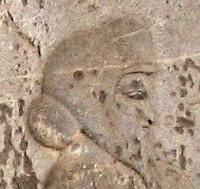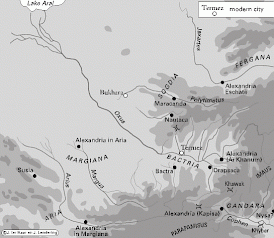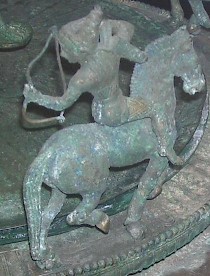Spitamenes
Spitamenes (Old Persian: Spitâmaneh): last Persian leader who fought against Alexander the Great (329-328 BCE).

In the summer of 330, the Persian king Darius III Codomannus was killed by his relative Bessus, who hoped to make an end to the war against the western invaders, led by the Macedonian king Alexander. Now that he could no longer demand the extradiction of Darius, Alexander had no excuse to continue the struggle. However, Bessus' followers started to call him king, and this was something that Alexander, who claimed to be king of Persia, could not tolerate. He started to pursue Bessus, who retired to Bactria and Sogdia.
Bessus moved from Aria to Margiana and reached Bactria along the route that was later known as the Silk road. He commanded many mounted archers, a kind of warriors to which the Macedonians had not yet found an answer. The backbone of their army was the infantry. Therefore, Alexander had to make a detour, and Bessus may have thought that he was left in peace.

In the winter of 330/329, Alexander reached the Hindu Kush range, where he founded a new city, Alexandria. The mountain passes were still covered with snow when the Macedonians crossed into Bactria. Bessus was completely surprised and retired to the north, across the river Oxus (the modern Amudar'ya), and Alexander easily captured the capital of Bactria, Bactra. Neither the desert between this city and the Oxus, nor the river itself proved a great obstacle to the Macedonians.
Now, the enemy lost heart. Bessus' courtiers Spitamenes and Datames arrested their leader and handed him over to Ptolemy, Alexander's friend and future biographer. This was Spitamenes' first known action, and nobody will have expected that he was to become Alexander's most dangerous enemy in this region.
The Macedonian army proceeded through Sogdia to the river that was locally known as Jaxartes (the modern Syrdar'ya). At the beginning of July 329, Alexander founded a new city, called Alexandria Eschatê, 'the furthest Alexandria' (modern Khodzent in Tajikistan). This was to be a garrison against the nomadic tribes north of the river, the Sacae. Five years after the beginning of the war, Alexander's triumph seemed complete. The Macedonian high command must have been unpleasantly surprised when messengers arrived, telling that the Sogdians were revolting and besieging Maracanda, the capital of Sogdia. Their leader was Spitamenes.
The interesting thing about his rebellion is that the name of the chief rebel suggests a connection with the Persian religion, Zoroastrianism. Its founder, the legendary prophet Zarathustra, was also called Spitama. It is very probable that the invaders had insulted the native population that had initially supported him. One of our sources mentions that a cavalry commander named Stasanor had tried to make an end to the Zoroastrian practice of exposing the dead to dogs and vultures, and this may well have been the cause of the Sogdian revolt. Another cause may have been cattle raiding: it is impossible that the invading army did not confiscate cows - the only sin that was condemned explicitly in the Zoroastrian creed.

Spitamenes commanded an efficient army of mounted archers, and was able to roam across the steppe country. Alexander's men were a lot slower, and an easy prey for the Sogdian rebel.
On hearing the news of the revolt, Alexander decided to go to back to lift the siege of Maracanda, but he was immediately attacked in his rear by the Sacae. He was forced to return again, to deal with the nomadic tribes in the north. Meanwhile, he sent an army of Greek mercenaries to Maracanda. This corps was never heard of again, and it took some time before the Macedonians understood that Spitamenes had completely annihilated it. No one had survived to bring the news.
After a minor victory over the Sacae, Alexander had the opportunity to deal with the revolt of Spitamenes. With his elite cavalry, the Companions, he covered 290 kilometers through desert country in three days, and reached Maracanda. The siege was now over, but Spitamenes was gone. There were rumors that he had gone to the west, but nobody could give more accurate information.
Alexander had lost many men, and was unable to do something. He decided to stay in Maracanda and wait for reinforcements. This offered Spitamenes, who had found allies among the tribe of the Dahae, an opportunity to attack Bactra (winter 329/328). He created great havoc, but was finally repelled by the satrap of Bactria, Artabazus, a Persian who belonged to Alexander's most trusted courtiers.
In the spring, Alexander sent out his general Craterus to the west, to fortify the oasis Margiana. This was necessary, because this would prevent Spitamenes from attacking Alexander's rear, Aria. Craterus founded a city and fortified five other towns, all situated on defensible hills.
This meant the end of the war against Spitamenes. He needed oases like Margiana, and was now cut off from his resources. In December 328, the Macedonian commander Coenus defeated him, and when the Sogdians and Dahae heard that the Macedonian main force was approaching, they killed their leader. His head was sent to Alexander.
Spitamenes had a daughter Apame, who was married to one of Alexander's most important generals, Seleucus (February 324). The couple had a son, Antiochus. After the death of the great conqueror, Seleucus and Antiochus became kings of Alexander's Asian possessions, and Apame was recognized as the mother of the Seleucid dynasty. Several towns were named after the daughter of Spitamenes: Apamea on the Orontes for example.